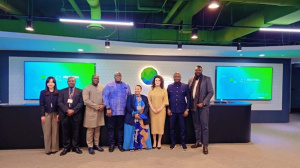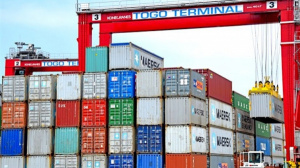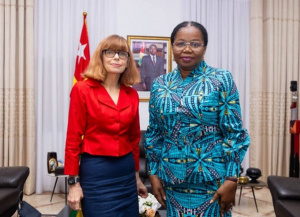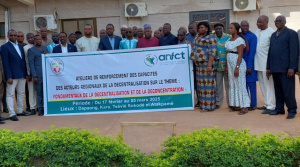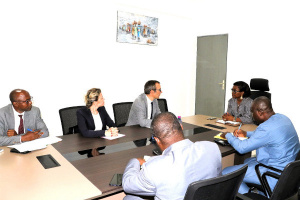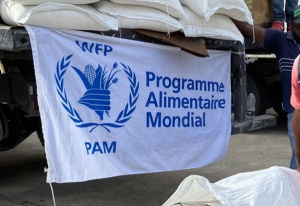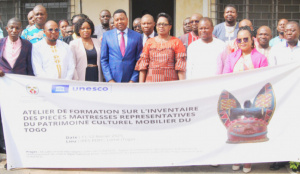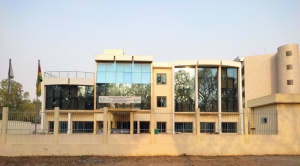Togo First
Climate Resilience: Togo to Get $28M from Green Climate Fund
Togo is about to receive CFA17 billion (roughly $28 million U.S. dollars) from the Green Climate Fund (GCF) via the West African Development Bank (BOAD). The funding will boost the country's climate resilience.
The BOAD recently secured the GCF’s approval for the project, which will directly help Togo's most at-risk communities.
This is the first time that Togo has received financing from the GCF. In detail, the package will help improve climate information services, multi-hazard early warning systems, and local adaptation efforts.
Set to be carried out over five years, the initiative will be steered by Togo’s Civil Protection Agency (ANPC) and monitored by the Ministry of Security and Civil Protection.
The BOAD, a GCF-accredited institution since 2017, provides financial assistance through grants, low-interest loans (ranging from 0 to 1.75%), guarantees, and refinancing options. Through its Climate Investment Programs (CIPs) and Climate Study Fund (CSF), BOAD aids WAEMU (West African Economic and Monetary Union) countries in creating projects that can bounce back from climate-related issues.
Climate Financing: An All-in-One Approach
Last October, the BOAD secured a CFA30 billion grant to fund climate adaptation projects in local communities within the sub-region.
Over the past, the regional bank also provided Togo with CFA4.3 billion to better fight and manage floods. The funds were extended through the BOAD’s Loans Adapted to Natural Disasters (PACAN) program, designed to boost the resilience of WAEMU countries faced with climate and health emergencies.
This article was initially published in French by Ayi Renaud Dossavi
Edited in English by Ola Schad Akinocho
Togo: Le Nouveau Reporter to Host Webinar on Fighting Fake News and Extremism Next Week
A week from now, Togo will host a webinar on tackling misinformation and violent extremism. These are issues that increasingly affect both the media and the public.
The webinar, titled “Facing up to fake news to effectively fight terrorism”, seeks to provide citizens and media pros with the tools to fight misinformation, which threatens social and political stability in West Africa.
Spearheaded by the online media outlet Le Nouveau Reporter, the event will gather experts such as Kondi Napo Sonhaye, an academic and digital specialist; Noël Kokou Tadegnon, a fact-checking journalist; and Dr. Kodjo Avuletey, a teacher-researcher.
The panel will present strategies to counter misinformation and boost the resilience of citizens and institutions.
The webinar will also serve as an interactive platform, giving journalists, students, and civil society members a space to exchange ideas and find practical solutions. This is especially important as disinformation becomes a growing concern for African countries, including Togo, which faces ongoing security challenges.
This article was initially published in French by Ayi Renaud Dossavi
Edited in English by Ange Jason Quenum
Togo Launches Trade Barrier Alert Mechanism to Boost Trade
The Chamber of Commerce and Industry of Togo (CCI-Togo) rolled out its Trade Barrier Alert Mechanism (MAOC) this Wednesday, February 19, 2025, in Lomé.
This initiative is funded by the International Trade Centre (ITC), GIZ, and CCI-Togo. It is part of a project led by the Ministry of Trade, Crafts, and Local Consumption. The MAOC aims to make trade easier by allowing companies to spot and report, in real time, barriers to their international activities.
The MAOC is a direct response to the challenges faced by Togolese businesses in global markets. Through an interactive platform, companies can report obstacles affecting their trade, access solutions and recommendations, and track actions to resolve these issues.
Ultimately, this new platform aims to strengthen cooperation between the private sector and government while improving the transparency and effectiveness of national trade policies.
This article was initially published in French by Ayi Renaud Dossavi
Edited in English by Ange Jason Quenum
Togo and Australia Strengthen Ties in Agriculture and Women's Empowerment
Togo and Australia are enhancing their cooperation, focusing on agriculture, women's empowerment, and regional security.
This was a key topic discussed during a meeting on February 18, between Togolese Prime Minister Victoire Tomégah-Dogbé and Bérénice Owen-Jones, the Australian High Commissioner to Togo.
During the sitting, the officials explored opportunities for strategic collaboration. “We discussed the possibility of closer collaboration in the agricultural sector, to promote women's empowerment, especially,” said Owen-Jones.
The Australian also highlighted Togo's important role in maintaining stability in West Africa. “We also talked about the security situation in the sub-region. And in this respect, I would like to recognize Togo's essential role as a bridge-builder,” she added.
Togo: Regional Councilors Trained in Local Governance
The Togolese Training Agency for Local Authorities (ANFCT) began training regional authorities in Dapaong on February 17, 2025. The program focuses on new regional councilors, installed in January, and their general secretaries, according to ATOP.
The training is designed to help participants understand decentralization and deconcentration, giving them the tools to make better decisions and implement local policies effectively. It also explains the role of the regional council, its responsibilities, and how it works with government ministries, decentralized departments, and civil society.
Key topics include an introduction to decentralization, the region's responsibilities as a local authority, and how the regional council interacts with other stakeholders. ANFCT Managing Director Komi Dodzi Denyo said the goal is to strengthen decentralization and give regional leaders the skills to manage public affairs more efficiently.
This program follows a similar training held in November for local officials. After Dapaong, sessions will continue in Togo's other four regions.
The training aligns with ANFCT's mission to support local elected officials, local authority staff, and government agents involved in decentralization.
This article was initially published in French by Esaïe Edoh
Edited in English by Ange Jason Quenum
Togo: Most Foreign Businesses Registered in 2024 Were Beninese
Beninese nationals officially created 505 businesses in Togo last year. According to the source, Togo’s, Centre for Business Formalities (CFE), the figure represents 20% of all businesses set up by foreigners–2,548–in 2024.
The year before, Beninese had registered 415, or 21% less, businesses. After Beninese, Nigerians followed with 412 businesses registered in 2024, down from 486 in 2023.
Niger came third with 394 businesses, up from 364 in 2023. Burkina Faso and Ghana followed with 172 and 142 businesses registered, respectively.
Last year, unlike in 2023, India was absent from the top five. Overall, citizens from 67 countries established businesses in Togo last year, down from 71 in 2023.
Togolese authorities attribute the rising proportion of foreigners opening shops in the country to a better business environment, which is the fruit of various incentives. These include dematerializing paperwork, reducing related time and costs, and simplifying administrative procedures.
This article was initially published in French by Esaïe Edoh
Edited in English by Ola Schad Akinocho
Togo: French Development Agency Invests CFA6.5 Billion in Agoè-Nyivé Solar Plant
The French Development Agency (AFD) will invest CFA6.5 billion in a solar power plant in Agoè-Nyivé, in the Greater Lomé region.
AFD Director Zolika Bouabdallah announced this on February 17, in a meeting with the Greater Lomé Governor Zouréhatou Kassah-Traoré and French Ambassador to Togo, Augustin Favereau. They also discussed ongoing AFD-backed projects in Lomé, the Togolese capital.
With a projected 8-10 MW capacity, the solar plant will cost about €10 million (CFA6.5 billion). Its output will be added to the national grid. The project aligns with the government’s ambition for universal electricity access by 2030.

The solar plant initiative is also part of France's commitment to Togo’s development, covering sectors like agriculture, education, vocational training, energy, water, and sanitation.
One major project that the AFD backs in Togo is the Lomé Urban Environment Project (PEUL). This program aims to improve living conditions in Greater Lomé. It has been implemented in phases, with the current phase running until 2026 and a fourth phase starting in 2023 and lasting until 2027.
This article was initially published in French by Esaïe Edoh
Edited in English by Ola Schad Akinocho
Togo: WFP Provides Food Assistance in Savanes Region
The United Nations World Food Programme (WFP) has started emergency food aid for vulnerable people in Togo's Savanes region. Announced on February 19, 2025, this initiative will support over 10,500 individuals, including refugees, internally displaced persons (IDPs), and local host communities.
The assistance will be delivered through e-vouchers, which families can use to buy essential food items from approved vendors. Each household will receive monthly vouchers worth up to 40,000 FCFA, depending on family size, for three months (February–April 2025). The program will cover areas such as Dapaong, Cinkassé, Kourientré, Djakpaga, and Poissongui. The European Union (EU) is funding this effort.
"Thanks to the support of the European Union, we are providing an effective and innovative solution while boosting the local economy," said Dr. Moïse Ballo, WFP’s Resident Representative in Togo.
The Savanes region is the hardest hit by food insecurity in Togo. Between October and December 2024, more than 175,000 people—14.3% of the region’s population—faced a food crisis or emergency-level hunger (classified as IPC 3+). This program aims to ease the crisis and support those most in need.
This article was initially published in French by Ayi Renaud Dossavi
Edited in English by Ange Jason Quenum
Cultural Heritage: Togo Works on Virtual Museum Project
Togolese authorities are working on a virtual museum project. Last week, Lomé, the capital, hosted a workshop related to the project. On the occasion, museum staff were trained in inventory techniques and using the ID Art app, a key tool in combating the illegal trade of cultural items.
The project aims to identify, digitize, and document objects from Togo's five public museums – including 50 key pieces – through a collaborative inventory adhering to international Object ID standards.
Spearheaded by the Ministry of Communication, Media and Culture, and supported by UNESCO, the project should help strengthen national laws and better manage cultural property.
According to Franck Missité, Director of Cabinet at the Ministry, cultural heritage drives economic development and plays a central role in social cohesion and intercultural dialogue. Adama Ayikoué, Director of Cultural Heritage, added that this structured inventory will improve the traceability of art objects and enhance the protection of the national heritage.
This article was initially published in French by Ayi Renaud Dossavi
Edited in English by Ola Schad Akinocho
Togo: Intellectual Property Institute Launches Contest to Visually Rebrand
The Togolese Institute for Intellectual Property and Technology (INPIT) is visually rebranding. In this framework, it recently launched a national competition to have designers provide its future logo and graphic charter.
Backed by the Ministry of Industry and Investment Promotion, the initiative aims to modernize the institution's image and better reflect its strategic missions.
The competition is open to all Togolese citizens and closes on March 10, 2025. The goal is to capture the essence of industrial property protection, technological development, and innovation. Participants are instructed to avoid using the national coat of arms or other official symbols.
Created in 2001, the INPIT protects inventions, trademarks, and industrial designs in Togo. It represents the African Intellectual Property Organization (OAPI) and liaises with international bodies such as WIPO.
Ayi Renaud Dossavi

